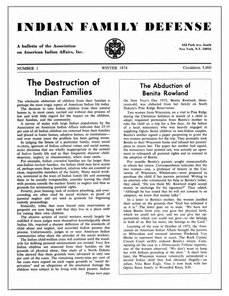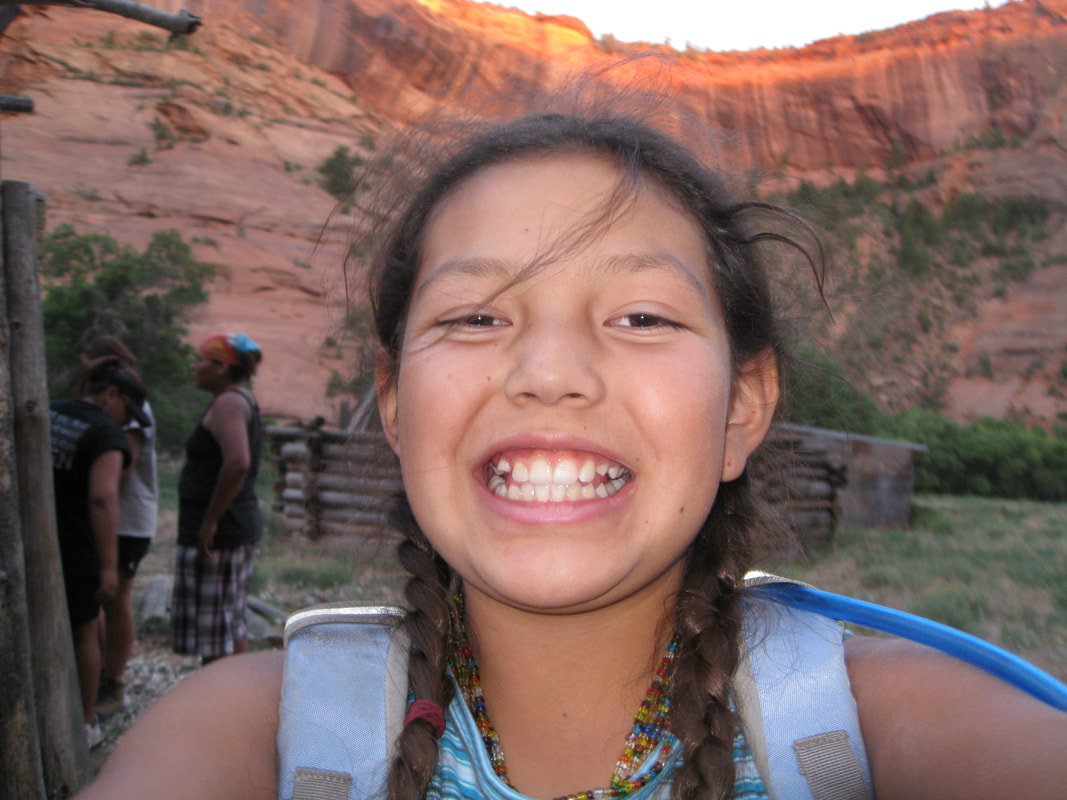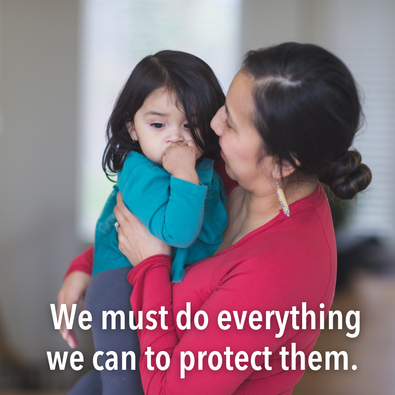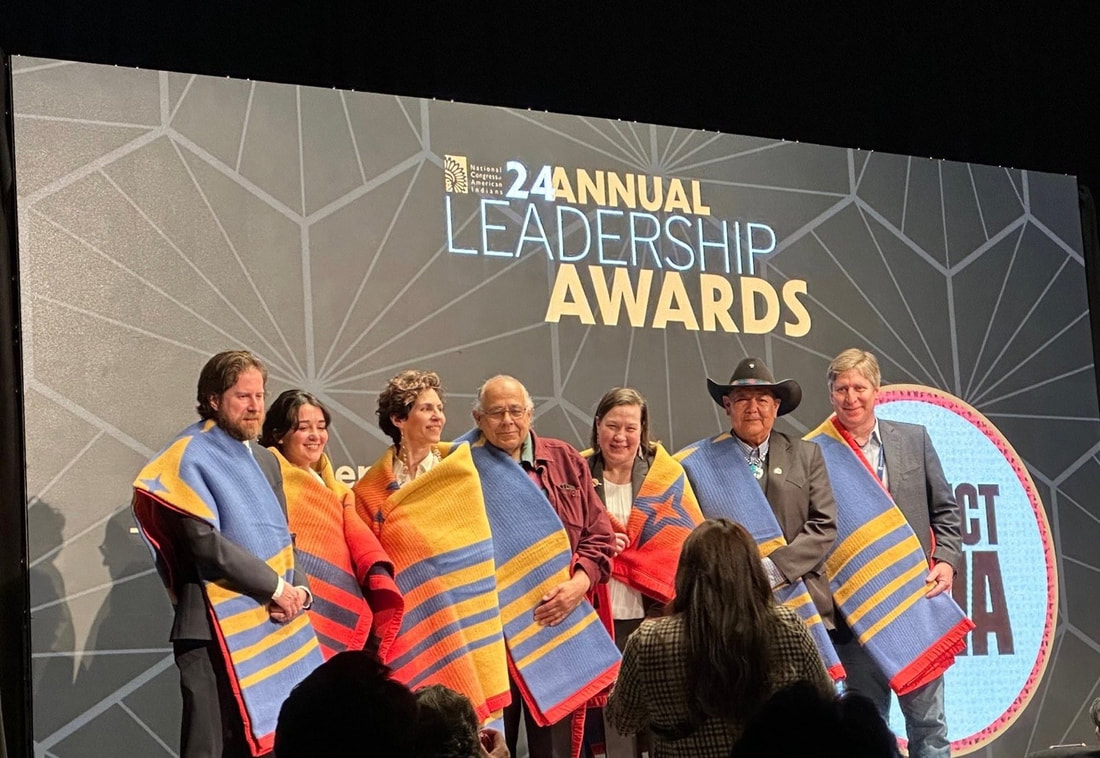Together, we can protect Native kids.
Since the passage of the Indian Child Welfare Act (ICWA), the Association has continued to work to ensure appropriate implementation of ICWA through litigation, advocacy and training.
|
ICWA was created in response to our evidence-based strategies.
|
|
Here is how you can support ICWA at the national and state levels.
|
On June 15, 2023, the Supreme Court voted to uphold ICWA.
Read the statement here and watch the video below.
ICWA Upheld in Brackeen v. Haaland
In August 2019, the Fifth Circuit Court of Appeals delivered a resounding victory for Tribes, Native children, and families by striking down a Texas federal court decision that declared the Indian Child Welfare Act unconstitutional. In Brackeen v. Bernhardt, individual non-Indian plaintiffs and the States of Texas, Louisiana, and Indiana argued against ICWA, claiming that protections for Indian children and families constitute illegal racial discrimination, and that ICWA’s federally-mandated state court standards illegally “commandeer” state courts and state agencies to carry out a federal scheme. The Fifth Circuit rejected the state and individual plaintiffs’ arguments on all fronts, finding ICWA to be an appropriate exercise of the federal government’s political government-to-government relationship with Tribes and Native peoples, and that ICWA did not unconstitutionally interfere with state child welfare systems.
The victory for ICWA in the Brackeen case has been an important recognition of the interpretation of federal Indian law that Congress has constitutional authority to develop legislation to protect Indian Country. The Association, joined by 56 other Tribal organizations, 325 Indian Nations, 21 state attorneys general, 20 law schools, and 30 child welfare organizations, filed an amicus curiae (“friend of the court”) brief to the Fifth Circuit (twenty-one states also filed an amicus brief supporting ICWA), providing important context into the horrific and well-documented abuses that led to the passage of the ICWA. The Association was heavily involved in documenting those abuses since the late 1960s – collecting data, giving congressional testimony and drafting the legislation based on its efforts in state courts to return Indian children to their families.
On November 7, 2019 the Fifth Circuit Court of Appeals ordered the case to be reheard en banc (meaning that it will be heard before all the judges in the Fifth Circuit) and with oral argument. Oral argument was on January 22, 2020 (read January 21 and January 22 press releases). Given the strength of the Fifth Circuit’s original decision, Tribes do have an advantage. The #ProtectICWA Campaign - led by the Association, Native American Rights Fund, National Congress of American Indians and National Indian Child Welfare Association - filed its amicus brief along with 486 federally recognized American Indian and Alaska Native Tribes and 55 other Native organizations to the Fifth U.S. Circuit Court of Appeals defending the constitutionality of the Indian Child Welfare Act as part of the Court’s en banc proceedings. Read the press release here.
Though we celebrate how 41 years of ICWA has strengthened Indian children and families, this litigation seeking to weaken ICWA seems non-stop. The stories of adoptions to non-Indian families being delayed or interrupted can often tear at the heart strings of the public. The information not included in those stories is that it is often the state courts’ and state agencies’ mistakes in implementing ICWA that have caused these delays in the first place.
The victory for ICWA in the Brackeen case has been an important recognition of the interpretation of federal Indian law that Congress has constitutional authority to develop legislation to protect Indian Country. The Association, joined by 56 other Tribal organizations, 325 Indian Nations, 21 state attorneys general, 20 law schools, and 30 child welfare organizations, filed an amicus curiae (“friend of the court”) brief to the Fifth Circuit (twenty-one states also filed an amicus brief supporting ICWA), providing important context into the horrific and well-documented abuses that led to the passage of the ICWA. The Association was heavily involved in documenting those abuses since the late 1960s – collecting data, giving congressional testimony and drafting the legislation based on its efforts in state courts to return Indian children to their families.
On November 7, 2019 the Fifth Circuit Court of Appeals ordered the case to be reheard en banc (meaning that it will be heard before all the judges in the Fifth Circuit) and with oral argument. Oral argument was on January 22, 2020 (read January 21 and January 22 press releases). Given the strength of the Fifth Circuit’s original decision, Tribes do have an advantage. The #ProtectICWA Campaign - led by the Association, Native American Rights Fund, National Congress of American Indians and National Indian Child Welfare Association - filed its amicus brief along with 486 federally recognized American Indian and Alaska Native Tribes and 55 other Native organizations to the Fifth U.S. Circuit Court of Appeals defending the constitutionality of the Indian Child Welfare Act as part of the Court’s en banc proceedings. Read the press release here.
Though we celebrate how 41 years of ICWA has strengthened Indian children and families, this litigation seeking to weaken ICWA seems non-stop. The stories of adoptions to non-Indian families being delayed or interrupted can often tear at the heart strings of the public. The information not included in those stories is that it is often the state courts’ and state agencies’ mistakes in implementing ICWA that have caused these delays in the first place.
Our Work in Brackeen v. Haaland |
Media Statements |
History of ICWA
|
The Association began its advocacy in Indian child welfare issues in 1967 and its research and advocacy directly led to the enactment of the Indian Child Welfare Act of 1978. Prior to the Act, the integrity of the Indian family was being devastated by state and locally sanctioned child welfare and adoption agencies who were removing Indian children from their families at an alarming and disproportionate rate.
The Association completed two studies in 1969 and 1974 exposing that 25 to 35 percent of all Indian children had been separated from their families and placed in foster homes, adoptive homes or institutions, and 90 percent of those placements were in non-Indian homes. [See H.R. Rep. No. 95-1386, p. 9 (1978)]. ICWA was created in response to these statistics and related testimony heard by Congress. It was designed to direct and guide certain decision-making activities that occur during Indian child custody proceedings in a state court in order to protect the relationship between the Indian child and Indian family, and preserve a Tribe’s effective exercise of its pre-existing inherent Tribal authority. 
The Association's Indian Family Defense Project worked to bring stolen children home, one child at a time. The stories that led to ICWA's passage and supported its implementation can be found in the Indian Family Defense bulletin. |
Our Case Work
Our activities have included participation in the Adoptive Couple v. Baby Girl and Mississippi Band of Choctaw Indians v. Holyfield United States Supreme Court cases, working to develop tribal-state agreements and state legislation in a number of states, including Washington State, and contributing to the ICWA guidebook published by the Native American Rights Fund.
Below are helpful documents regarding the ICWA case, Adoptive Couple v. Baby Girl:
Below are helpful documents regarding the ICWA case, Adoptive Couple v. Baby Girl:
- The Association's Amicus Brief for the case of Adoptive Couple v. Baby Girl
- The Association's Case Analysis in Adoptive Couple v. Baby Girl
- Understanding the Supreme Court's Decision in Adoptive Couple v. Baby Girl
- The Continued Protection of Indian Children and Families after Adoptive Couple v. Baby Girl
- Authority of the Fed. Government to Oversee and Enforce the Implementation of ICWA
ICWA Defined
ICWA provides procedures for identifying an Indian child early on and involving the child’s extended family and Native Nation in the process to ensure that everything has been done to keep the Indian family whole, and cultural connections intact.
ICWA requires that: the state must look into the enrollment status of a Native child, provide Tribes and parents notice in child welfare proceedings, and ensure that Tribes are given the opportunity to intervene in the proceedings or transfer jurisdiction to the Tribal court.
ICWA does not prevent adoption of an Indian child to a non-Indian family. Instead, ICWA provides procedures for identifying an Indian child early on and involving the child’s Tribal Nation in the process to ensure that everything has been done to keep the Indian family whole, and cultural connections intact.
ICWA requires that: the state must look into the enrollment status of a Native child, provide Tribes and parents notice in child welfare proceedings, and ensure that Tribes are given the opportunity to intervene in the proceedings or transfer jurisdiction to the Tribal court.
ICWA does not prevent adoption of an Indian child to a non-Indian family. Instead, ICWA provides procedures for identifying an Indian child early on and involving the child’s Tribal Nation in the process to ensure that everything has been done to keep the Indian family whole, and cultural connections intact.
ICWA is the Gold Standard
|
ICWA’s provisions apply in state child custody proceedings when there is an Indian child involved. ICWA requires that: the state must inquire into the enrollment status of a Tribal child, provide Tribes and parents notice in child welfare proceedings, and ensure that Tribes are given the opportunity to intervene in the proceedings or transfer jurisdiction to the Tribal court.
The party removing a child or terminating parental rights must provide active efforts to prevent the breakup of an Indian family and present testimony of a qualified expert witness supporting such a decision before placing an Indian child in foster care or terminating the parental rights over an Indian child. Such procedures seem reasonable for any child custody proceeding to ensure that the child is not removed from family and extended family without first trying to prevent the breakup of that family. And, these procedures are considered the “gold standard” in child welfare. Even though the majority of child welfare organizations consider ICWA the “gold standard,” ICWA is constantly being litigated. “State courts of appeal interpret the law across the country at a rate of once every other day. There are, on average, 200 appellate cases annually.”[1] Because of the numbers, many Tribes do not have the capacity to take on these matters – especially since Tribes are often not notified by state courts properly, which increases the duration of litigation and the amount of harm on the child. Instead, many Tribes do not litigate and instead seek to support the cultural identity of the child and his or her connection with their Tribe; litigation almost always causes bitterness for the adoptive family and not healing. “In some decisions, the court’s confusion [about the Tribe’s position] is apparent and its ignorance of the Tribe’s position comes through in the opinion.”[2] |
Studies have shown that Indian children adopted to non-Indian families fair worse psychologically than white peers. Suicide rates, depression and alcoholism are higher in American Indian adoptees than in other groups. Involving the Tribal Nation in the placement or adoption is crucial to provide culturally appropriate services to support the Indian child and family.
|
Meanwhile, nationwide (even after 41 years of ICWA), American Indian and Alaska Native children are placed into foster care at a rate 2.7 times greater than their proportion in the general population. This disproportionality is not happening because there are higher reports of abuse or neglect in American Indian communities; in fact, these numbers are consistent with other populations. The disproportionality comes as one moves further into the state child welfare system decision-making processes: the rates of removal of Indian children from their families are disproportionate compared to non-Indian families. Studies that have researched systemic bias in the child welfare system have found that Indian families were two times more likely to be investigated and four times more likely to have their children removed and placed in foster care than their white counterparts. ICWA was meant to provide protections against this systemic bias and reduce the flow of Indian children into these systems.
How You Can Support Indian Children and Families
If our opponents succeed in dismantling ICWA, they will have also cleared the way for a larger attack on Native families, Native land, and Tribal sovereignty. We will continue to defend ICWA in the courts and through education of state governments and the public. Here is how to support ICWA.
National #ProtectICWA Campaign
|
The Protect ICWA Campaign was established by the National Indian Child Welfare Association, the National Congress of American Indians, the Association on American Indian Affairs, and the Native American Rights Fund. Together, we work to serve and support Native children, youth, and families through upholding ICWA. The Campaign works to inform policy, legal, and communications strategies with the mission to uphold and protect ICWA - against the Goldwater Institute and others that seek to overturn ICWA and keeping Indian children and families together.
Protect Native Children at the State LevelIt’s critical we tell our representatives to codify ICWA’s protections at the state level. Please tell your state leaders to protect Native children, families, and sovereignty by passing new comprehensive legislation and enforcing current laws on the books, where they exist.
|
Visit the Lakota People's Law Project website to learn more.
2023 NCAI Government Leadership Award
|
Thank you to National Congress of American Indians for honoring the Association along with the National Indian Child Welfare Association and the Native American Rights Fund with the 2023 Government Leadership Award for our work on the #ProtectICWA Campaign.
Shannon O'Loughlin, citizen of the Choctaw Nation of Oklahoma, CEO and Attorney for the Association and Frank Ettawegeshik, citizen of the Odawa Nation of Michigan and Association Board President were on hand to accept the award in Washington, D.C. on February 21, 2023. |












